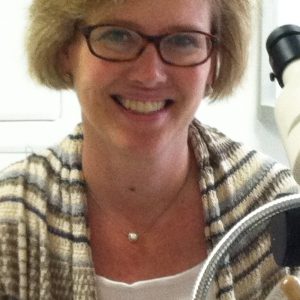
Andrea Page-McCaw, Ph.D.
Stevenson Chair
Professor of Cell & Developmental Biology
AAAS Fellow - 2018
- : andrea.page-mccaw@vanderbilt.edu
- : (615) 875-5841
- :
530 Engineering and Science Building
2414 Highland Ave
Nashville, - 37232-8240 - :
507 Engineering and Science Building
2414 Highland Ave
Matrix metalloproteinases (MMPs), tissue remodeling, wound healing, developmental biology, Drosophila, genetics, receptor, and signaling, immunity.
Lab Website
Research Description
During embryogenesis, animals develop complex structures, but they often have to modify their morphology to meet the demands of continuing growth or environmental challenge. This is known as tissue remodeling. Tissue remodeling is also required for animals to heal wounds, and it goes awry during cancer when tumors usurp tissue remodeling functions to promote metastasis. The matrix metalloproteinase (MMP) family of extracellular proteases is required for tissue remodeling events throughout the animal kingdom. These proteases are also upregulated in cancer and many inflammatory conditions such as arthritis. Understanding how MMPs promote tissue remodeling, both in normal and pathological circumstances, is a central question in my laboratory.
Drosophila melanogaster (the common fruitfly) has been an important model organism for understanding cell and developmental biology because of their advanced genetics and beautiful cytology. Although mammals have about 24 MMPs with overlapping substrate specificity and functional redundancy, Drosophila has only two MMPs, greatly simplifying genetic analysis of MMP function. We have found MMPs to be absolutley required for developmental tissue remodeling and epidermal wound healing in our system. We are currently investigating how basement membrane is modified and expanded in coordination with tissue growth during development.